- Home
- Anne Bishop
Shadows and Light Page 21
Shadows and Light Read online
Page 21
Skelly laughed. “That’s a bit like saying the sun is warm, the rain is wet, and the wind can blow sweet or fierce. Men are no strangers to women’s moods. Even the Great Mother has them.” He glanced at her, considering.
Air whistled out from between her teeth.
“Men have moods, too,” Aiden said quickly.
“Oh, that they do, and, according to women, what we lack in variety we make up for in quantity.”
Lyrra grunted. It might have been a choked-back laugh. Aiden wasn’t sure.
“A few years ago,” Skelly said, “another fellow and I were both taken with the same fair lady, and she seemed to enjoy our company without giving a hint as to which one she preferred. Wicked thing to do to a young man’s heart — although my sweet granny would have said it wasn’t our hearts that found the young lady so compelling. Well, we did what young men do. We strutted and bragged. We swaggered and boasted. Annoyed the patience out of everyone around us. After this had been going on awhile, my sweet granny took us both over to a pasture where the rams were doing a bit of deciding among themselves about who might be courting the fair ewes. And she told us if we were going to act like rams in most ways, we could settle things by butting heads the same way the rams did, and leave the rest of the village out of it. ‘Twas a sobering moment, I can tell you, when the other fellow and I looked at each other and decided the fair lady really wasn’t worth a cracked head. And she wasn’t worth it. While we’d been busy strutting and bragging, what did she do but go and fall in love with a quiet merchant’s son who lived in another village. So the other fellow and I went to the tavern one night and drowned our mutual sorrow with a few too many tankards of ale. And I can tell you, those rams never had a headache like the ones we had the next morning.”
“And what about the fair lady?” Aiden asked.
“Oh, she married her quiet merchant’s son, and they’ve been happy ever since.”
Lyrra’s eyes narrowed as she turned her head to study Skelly’s face. “You made that up. All of it. From the fair lady to the rams, right down to your sweet granny.”
“Ah, no,” Skelly protested. “I’ve got a sweet granny. Indeed I do. And if I’d ever been so foolish, she would have done just what I’d said.”
“But you made it up,” Lyrra insisted.
Skelly smiled at her. “I’ve been known to tell a tale or two on a winter’s night. Or a summer one, if you’re counting. There are some among every kind of people who hold the tales close to their hearts. And whether the Muse whispers so that I have to listen close or shouts in my ear, I still listen. And I tell the tales that come to me.”
Lyrra looked as stunned as Aiden felt. Did Skelly know who they were? Did he know who Lyrra was? Had Breanna managed somehow to convey that in her message on the wind?
“So it’s glad I am that cousin Breanna set you on this path. Your packhorse carries instruments, and since the Muse hasn’t been whispering much lately, I’m hoping you have a few new stories and songs you’d be willing to share.”
Lyrra looked down at her mare’s neck. “The Muse has been whispering — and shouting for all the good it’s done — but perhaps those stories aren’t meant for you. Perhaps you don’t need them, and that’s why you don’t hear them.”
“Perhaps. But how can anyone know if a story is needed until it’s heard?” Skelly shrugged. Looked a little uncomfortable. “I’m thinking … I apologize for teasing you. The stories about the Fae always make them seem so…”
“So much like rams?” Aiden finished dryly.
“Well,” Skelly hedged. “Just more outspoken, you could say, about … earthier matters.”
What kind of stories did witches tell about the Fae? Aiden wondered. And how many tankards of ale would we have to tip before I could coax a couple out of him?
“Perhaps we could trade a story for a story,” Lyrra said, echoing Aiden’s thought.
Skelly grinned. “There’s some that will have to wait until the children are put to bed before they’re told.”
“I know a few of those.”
“I’ll hold you to that, storyteller,” Skelly said. “But we’re here, and it’s news the family will be wanting.”
“We’ve news to give,” Aiden said, realizing how much his mood had lightened in the past few minutes now that it was once more shadowed by what was happening in the east beyond the Mother’s Hills. And he hoped that, when the letters Nuala and Breanna had written to their kin and sent along with him were opened and read, there would be no one in the small village they rode into who would be grieving for lost kin.
They’d been given the guest room in a house that belonged to one of Nuala’s cousins. After they’d done what everyone seemed to assume the Fae did almost every waking minute, Lyrra sighed contentedly, stretched her arms over her head — and started giggling.
“What?” Aiden said, turning his head to look at her.
“This picture of two men in a pasture, pawing the ground with their feet before running toward each other to crack their heads together just popped into my head.”
“Are they naked men?” Aiden asked, rolling over to prop himself up on one elbow.
She looked thoughtful. “They should be, shouldn’t they? But I can’t quite seem to get them there.”
“I won’t say I’m disappointed.”
“You would never do anything so foolish, would you?”
“I think it’s safe to say I’ll never try to crack another man’s head with my own.” But he wondered if she’d think all the nights he’d worked on a tune, hoping the song would impress her, amounted to the same thing. “Besides,” he added, resting a hand on her belly, “you’re taken. And I’m taken. So the only heads we have to butt are each other’s.”
“I think some of the ladies were disappointed to see a ring on my left hand.”
“I think some of the men were equally disappointed.”
She smiled at him. “We’ll give them some good tunes tonight.”
“The best we have.”
She closed her eyes and drifted into sleep.
Aiden settled down and tried to sleep, but the songs danced through his mind.
They’d give their hosts the best songs they had — but not all of them would be joyful.
“It’s an imposition, and I know it,” Skelly said. “But the lad got so excited when he’d heard it was the Bard himself who was staying in the village overnight, it would have broken his heart to refuse him.”
Smiling, Aiden waved off the explanation. “I’ve listened to plenty of apprentice minstrels. I can listen to another.”
“Well, that’s just it, isn’t it?” Skelly said, looking uncomfortable. “He’s not an apprentice minstrel. Just a boy who loves to play music.”
The words pained him, but Aiden kept his smile in place. “That’s how we all begin.”
Maybe it had been a bit of head butting, as Lyrra so curtly put it when she found out, to tell Skelly that the Fae guesting in his village were the Bard and the Muse. It had certainly delighted him to see Skelly’s mouth fall open — and to watch the man’s eyes almost pop out of his head when he thought back to the conversation on the road and realized he’d been talking about the Muse to the Muse. Maybe it had been a need to let the witches know that the Fae had something to offer and didn’t come down the shining roads just for their own amusement.
Whatever the reason, by the time he’d finished the tankard of ale Skelly had poured for him at the evening meal, the news had run through the village, and the small gathering that would have been held in the tavern had turned into a large gathering in the village square. Benches and blankets were being carted out of people’s homes and set up to face the bench cushioned with folded blankets that he and Lyrra would use.
The wiccanfae might not think much of the Fae in general — and he wondered how different their welcome would have been if he and Lyrra hadn’t been wearing the tokens Nuala had given them — but it became clear that they were hungry for
the gifts the Bard and the Muse could offer.
And that cut at him. He didn’t hoard his gift, didn’t keep it for just the Fae. He’d come across many a human musician who just needed the spark kindled a bit for it to catch fire and truly shine. But, until a year ago, he, like the rest of the Fae, had used the shining roads in the Old Places without thinking about the people who lived in those places — when he noticed them at all.
“If the crowd that’s gathering doesn’t make him nervous, let him play,” Aiden said.
“His nerves are dancing, and I’ll be surprised if he manages to get out more than a word here and there, but I’m grateful to you for giving him the chance.”
Don’t be grateful for what we should have done for the people who are the Pillars of the World. Just another thing we chose to forget along the way.
With a smile, Aiden turned away to help Lyrra set out the instruments. He settled on the bench and tuned the harp. By the time he was done, his half-healed fingers were so sore, he knew he wouldn’t be able to play.
The next time we come by this way, I’ll play for them.
He pondered that certainty for a moment and knew it was true. They would come back this way to share their songs and stories.
By the time everyone had assembled, it looked like every person within shouting distance was in the village square, crowded up as close as they could get in order to hear.
In order to keep the bargain Skelly had made, some of the musicians made their way to the front of the crowd, stood a little to one side of Aiden and Lyrra, and began to play.
The first tune was a familiar one. Aiden had heard variations of it in the Clan houses as well as in human taverns. The singer was nervous, and her voice tended to fade more often than not. But the applause from the crowd gave her and her companions more confidence, and her voice was steady for the next song.
The third song was one he’d never heard before, and he found himself leaning forward to catch the words and the tune, almost grinding his teeth when the singer kept faltering. It wasn’t until Lyrra slid over and gave him a hard jab with her elbow that he realized it was his own intense stare that was unnerving the singer. He lowered his eyes and, with effort, kept himself from leaping up and demanding that she sing it again. There was time. He’d corner her later.
After the musicians, Skelly stood up and told a story about his sweet granny, who was, apparently, the stern woman sitting on the other side of the square with her hands folded and her hair scraped back into a bun that must have made her scalp ache. It made Aiden’s scalp ache just looking at her. And the expression on her face was fierce enough to frighten any rational man.
Obviously, Skelly wasn’t a rational man, because he continued his story, gesturing now and then toward his sweet granny. When he finally got to the punch line, the first person to burst out laughing was his granny. The laughter transformed her face, and her eyes sparkled with mischief. As she pulled the pins out of her hair, she said, “Ah, Skelly. That story gets worse every time you tell it.”
Aiden heard Lyrra’s soft grunt, and he knew she, too, had taken the bait without realizing there was a hook in it. Seeing the grins on the villagers’ faces and how the old woman now looked like a sweet granny, he understood that the scraped-back hair and the fierce expression were props for Skelly’s story. Something he was sure everyone else in the village had known.
Then the boy came up with his small harp. After bowing to Aiden and Lyrra, he sat on the small bench Skelly brought over for him, settled himself, and began to play a song he wrote himself.
The boy had potential. Aiden felt his Bard’s gift swell with the desire to kindle that spark until it burned brightly.
The song, on the other hand…
When the boy finished, he lowered his head. The applause from the crowd was more a response to his courage than an indication of pleasure.
Then the boy raised his head, looked Aiden in the eyes, and said, “It’s not a good song.”
“No, it isn’t,” Aiden replied gently. “But it is a good first effort. With time and practice, you’ll write better songs.” He reached for his harp.
“Aiden,” Lyrra whispered fiercely. “You can’t play the harp yet. Your fingers aren’t healed.”
“They’re healed well enough for this song.” He set his fingers on the strings, suppressed a wince, plucked the first chord, and sang.
He watched the boy’s eyes widen in disbelief and disappointment — and something close to hope. He watched the adult faces in the crowd settle into a painfully polite expression. And he knew by the look on Lyrra’s face that she would, at that moment, gladly deny knowing him.
It was, if one wanted to be kind, a bad song. And he sang all five verses and their refrains.
When he was done, he handed the harp to Lyrra, flexed his painfully sore hands, and smiled at the boy. “That was the first song I ever wrote. I was about your age. But with time and practice, I’ve gotten a bit better.” He took a breath and began to sing “The Green Hills of Home.” It was a song about a traveler, alone and lonely, yearning for a place far away. It was a song about a man, alone and lonely, yearning for the lover who wasn’t there. He’d written it over the winter, when he’d been traveling and Lyrra had been at Brightwood.
Her voice joined his, harmonizing. She didn’t even try to play the harp, so there was nothing but their voices, filled with the same remembered yearning.
When the last note faded, he watched people brush away tears — and felt the sting of tears in his own eyes.
Lyrra began plucking a simple tune on the harp, something that had no words. Aiden chose one of the whistles and joined her, letting the song flow through him. They used it as a transition song, when the audience needed time to settle again. Then he sang the song about the Black Coats — and watched the adult faces turn grim. Lyrra followed it with the poem about witches that he’d set to music. After that, they did a few romantic songs, gradually moving toward songs that were lighter and humorous. By the time they got to “The Mouse Song,” people were grinning and stifling chuckles — but a lot of them seemed to be watching something over Aiden’s shoulder.
That’s when he felt the presence of something moving softly behind him, coming closer and closer. He could almost feel the heat from a body, warm breath against his cheek. His nerves jumped, but he didn’t turn around. If there were some danger, surely the people watching would give him warning.
Lyrra glanced around. Her eyes widened. She choked back a laugh and kept on singing. But she couldn’t manage the annoyed tone she usually did with that song.
When they finished, Aiden slowly turned his head toward the warm breath just above his left shoulder. He stared at the black muzzle, the nostrils breathing in his scent. He looked up into a brown eye. He noticed the pricked ears. Slowly raising one hand, he rested it lightly on the muzzle, and whispered, “A dark horse. It’s a dark horse.”
“A herd of them came up from the south last summer,” Skelly’s granny said. “A few stayed in the southern end of the Mother’s Hills. The rest kept moving north. Some of them wintered here. When spring came, they continued heading north. All but this one.”
Aiden twisted on the bench to get a better look at the animal. The dark horses had disappeared after Ahern, the Lord of the Horse, died last summer. Fae horses were more intelligent than human horses, and the dark horses — Ahern’s “special” horses — were the most intelligent of all. None of the Fae had been able to find out what happened to them. Had Ahern given some last command that had sent them into the Mother’s Hills instead of going up one of the shining roads to Tir Alainn? Or had it been instinct that had driven them here?
“Who does he belong to?” Aiden asked.
“No one,” Skelly replied. “I’ve had a saddle on him a time or two, and he’s well trained. But he’s made it clear he wasn’t for any of us. We’ve had the impression he’s been waiting for something.”
“Sing another song, Bard,” Skelly’s g
ranny said. “Sing another song.”
Lyrra quietly plucked the introduction to “Love’s Jewels.” Aiden sang, unable to turn away from the horse focused so intently on him. Seeing a dark horse, remembering Ahern, it made the events of last summer flood back, and by the time he’d reached the last line of the song, his throat was tight.
“I’m sorry,” Aiden said to the horse. “I can’t sing any more tonight.”
The horse snorted softly, a disappointed sound.
“There will be time enough to sing him another tune,” Skelly said, smiling.
Puzzled, Aiden turned toward the man.
“Looks to me like he’s chosen his rider,” Skelly said. “And you have a horse.”
Chapter Fifteen
It was late afternoon when Morag, Ashk, the merchant captain, and his two men crested the low hill and looked down on the tidy village spilling out from the bottom of the hills toward the harbor and the deep blue of the sea. A little ways out, a string of islands formed a breakwall that protected the harbor from the sea’s moods.
To Morag’s untrained eye, the harbor looked like the sort of place sailors would be keen to tuck their ships into when they weren’t out earning their living on the water. So why weren’t there more than two large ships moored to the docks? Why did all the boats but those two look like small fishing boats?
And what was it about this tidy village that bothered her?
She glanced at Mihail, saw the way he flinched while trying to pretend he didn’t notice that glance. He’d been tense and taciturn all through the journey back to this village. The tension had increased as they got closer — and the shadows continued to flicker across his face.
She suppressed a sigh. She’d hoped those shadows would go away once they’d left Padrick’s estate, hoped that whatever trouble might draw Death to this man had been left behind. But the shadows had remained, no more constant than they’d been when she’d first seen them, but there nonetheless.
She hoped the kindness that had guided him to take the books from the bookseller in the first place and then make the journey to Padrick’s house wouldn’t be repaid with pain.

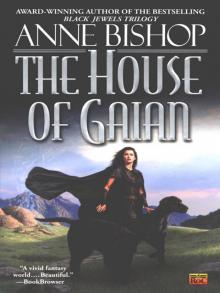 The House of Gaian
The House of Gaian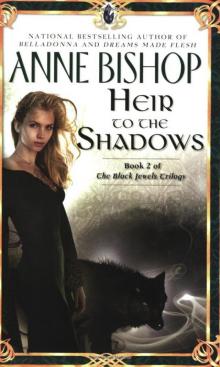 Heir to the Shadows
Heir to the Shadows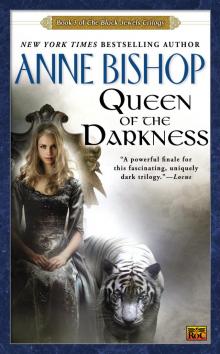 Queen of the Darkness
Queen of the Darkness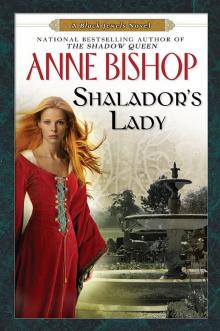 Shaladors Lady
Shaladors Lady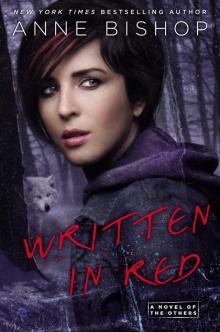 Written in Red
Written in Red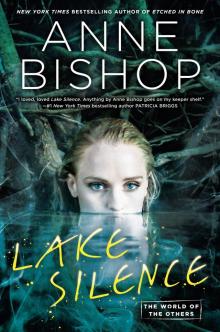 Lake Silence
Lake Silence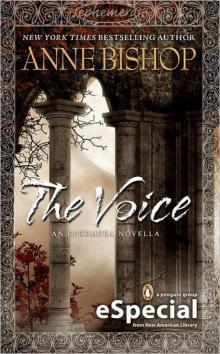 The Voice
The Voice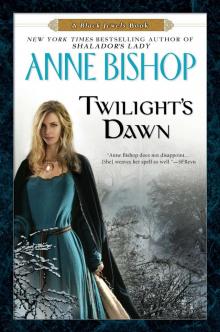 Twilights Dawn
Twilights Dawn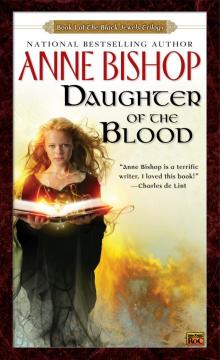 Daughter of the Blood
Daughter of the Blood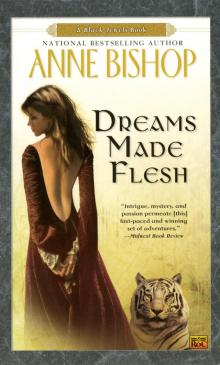 Dreams Made Flesh
Dreams Made Flesh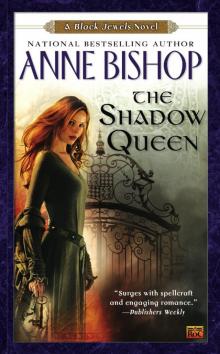 The Shadow Queen
The Shadow Queen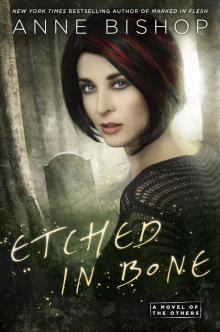 Etched in Bone
Etched in Bone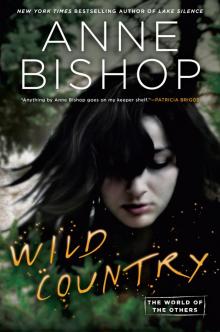 Wild Country
Wild Country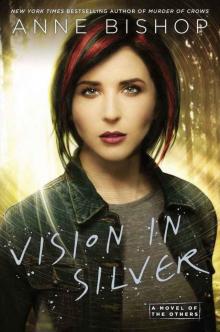 Vision in Silver
Vision in Silver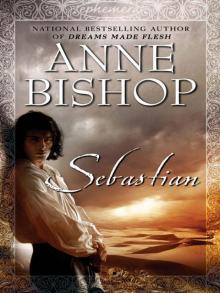 Sebastian
Sebastian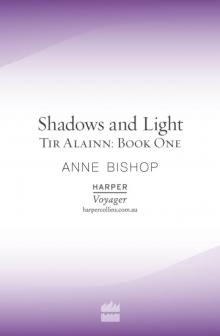 Shadows and Light
Shadows and Light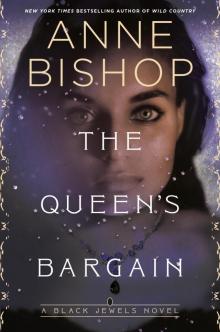 The Queen's Bargain
The Queen's Bargain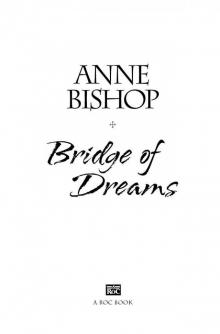 Bridge of Dreams
Bridge of Dreams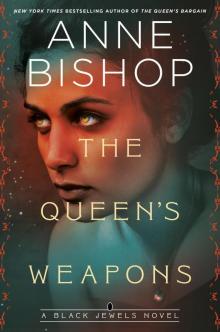 The Queen's Weapons
The Queen's Weapons Pillars of the World
Pillars of the World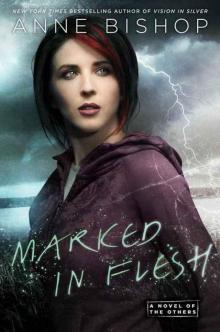 Marked in Flesh
Marked in Flesh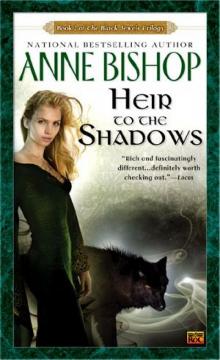 Heir to the Shadows dj-2
Heir to the Shadows dj-2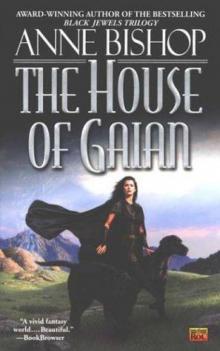 The House of Gaian ta-3
The House of Gaian ta-3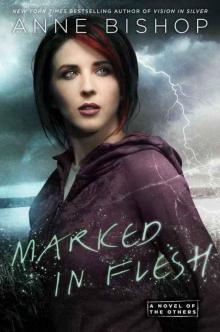 Marked In Flesh (The Others #4)
Marked In Flesh (The Others #4)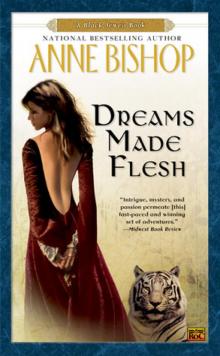 Dreams Made Flesh bj-5
Dreams Made Flesh bj-5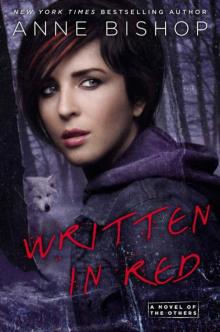 Written In Red: A Novel of the Others
Written In Red: A Novel of the Others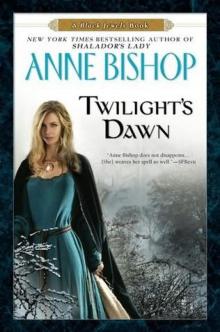 Twilight's Dawn dj-9
Twilight's Dawn dj-9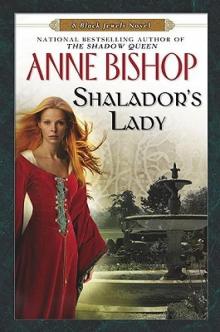 Shalador's Lady bj-8
Shalador's Lady bj-8 The Pillars of the World
The Pillars of the World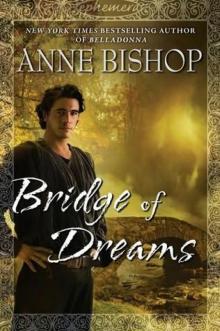 Bridge of Dreams e-3
Bridge of Dreams e-3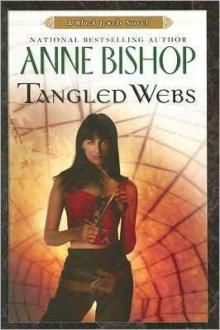 Tangled Webs bj-6
Tangled Webs bj-6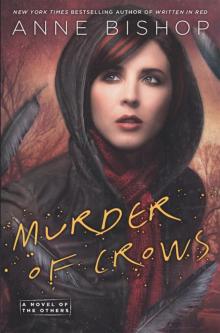 Murder of Crows: A Novel of the Others
Murder of Crows: A Novel of the Others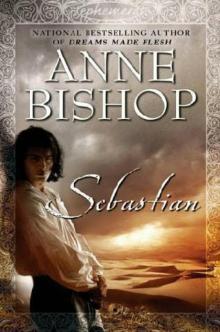 Sebastian e-1
Sebastian e-1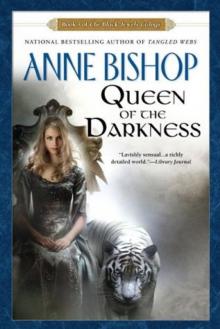 Queen of the Darkness bj-3
Queen of the Darkness bj-3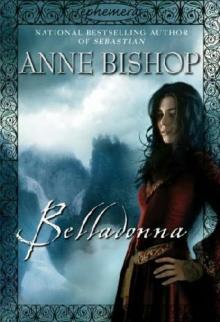 Belladonna e-2
Belladonna e-2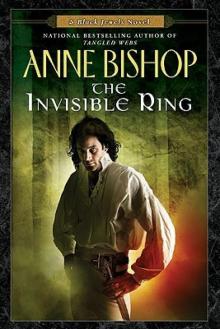 The Invisible Ring bj-4
The Invisible Ring bj-4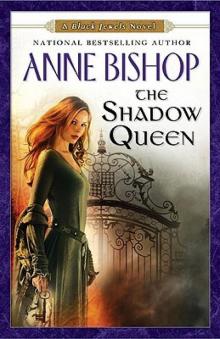 The Shadow Queen bj-7
The Shadow Queen bj-7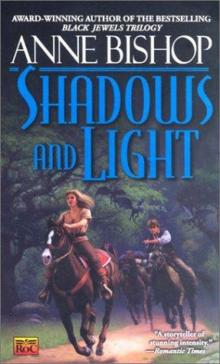 Shadows and Light ta-2
Shadows and Light ta-2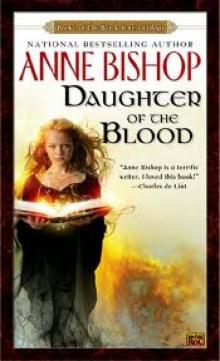 Daughter of the Blood bj-1
Daughter of the Blood bj-1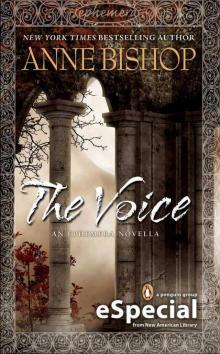 The Voice: An Ephemera Novella(An eSpecial from Roc)
The Voice: An Ephemera Novella(An eSpecial from Roc)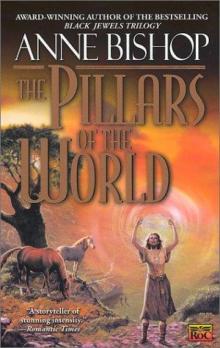 The Pillars of the World ta-1
The Pillars of the World ta-1